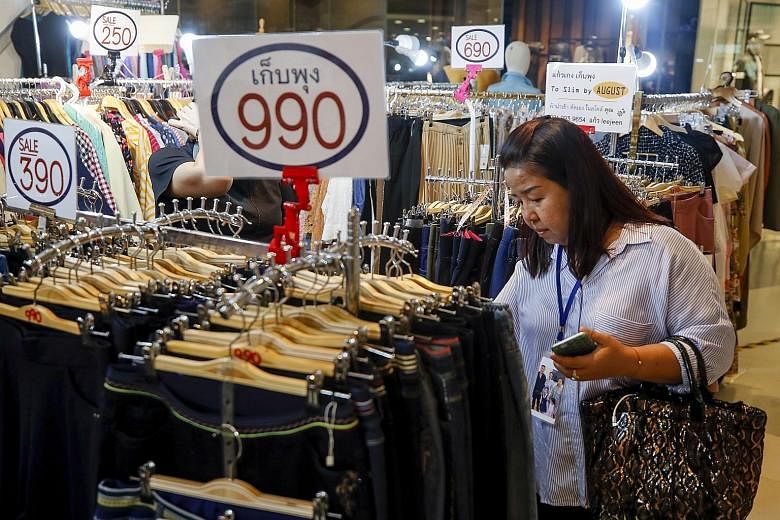BANGKOK • Thailand's economy grew at the slowest pace in almost five years in the second quarter, as exports and tourism were buffeted by US-China trade tensions and a strong local currency.
Gross domestic product (GDP) rose 2.3 per cent from a year ago, down from 2.8 per cent in the first quarter, the National Economic and Social Development Council said yesterday.
This is the slowest pace since the third quarter of 2014. The expansion matched the median estimate of 2.3 per cent in a Bloomberg survey of economists.
A slowdown both domestically and abroad affected the quarterly growth, Mr Thosaporn Sirisumphand, the council's secretary-general, said at a briefing in Bangkok. The US-China trade war, global jitters and a drought all remain as risks going forward, although a government stimulus package announced last week could help offset the damage, he added.
Thailand's trade-reliant economy has been hit by slumping exports, a surging currency and cooling tourist arrivals, with a looming delay in the budget since a new government took office last month posing a further risk.
The central bank unexpectedly cut its benchmark interest rate earlier this month for the first time in more than four years, and said it sees more room to ease ahead.
The economic council cut its full-year growth forecast to 2.7 per cent to 3.2 per cent - down from an earlier estimate of 3.3 per cent to 3.8 per cent - as the second-quarter pace should be the slowest this year, the council's deputy secretary-general Wichayayuth Boonchit told reporters. The forecast for exports was cut to a 1.2 per cent contraction, from previous estimates of 2.2 per cent growth.
After the release of the growth data yesterday, Bank of Thailand governor Veerathai Santiprabhob said the monetary authority will likely cut its 2019 economic growth forecast at the September policy meeting. The central bank currently estimates 3.3 per cent expansion for this year.
The sustained decline in export gains has spilled over to domestic demand, Nomura Singapore economists Euben Paracuelles and Charnon Boonnuch wrote in a research note yesterday. They maintained their expectation for full-year GDP growth of 3 per cent, but added that "the balance of risks to our forecast remains tilted to the downside".
Mr Gareth Leather, senior Asia economist at Capital Economics, said the expansion could slow to 2.5 per cent this year.
"With weak global demand and a downturn in the tourism sector likely to drag on growth prospects over the coming quarters, we expect the economy to remain weak," he wrote in a research note.
GDP rose a seasonally adjusted 0.6 per cent in the second quarter compared with the previous three months, the council said, below the 0.7 per cent median estimate in a Bloomberg survey.
In addition to the trade war, exports have been hit by gains of nearly 8 per cent in the baht over the last 12 months, making it Asia's best-performing currency tracked by Bloomberg. The central bank has taken a series of measures to curb short-term inflows and intervened in the currency market to curb the baht's strength, leading to a record-high level of foreign exchange reserves.
BLOOMBERG

